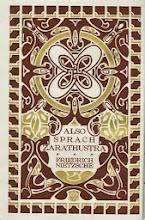Eliade on Monasteries and Madrassas
hey guys, what's going on? not too much here, just trying to get through grad school. had two midterms last week, think i did well on both of them. i think i've really turned a corner in my understanding here this week, so i'm happy about that. but anyways, i was reading this book 'the sacred and the profane' by mircea eliade in my religion class (he is like one of the top legends in the field of comparative religion) and at the back of the book, he's talking about the history of the study of religion and it reminded me of that article alex sent out, that the only cultural advancement the islamic world gave to the west is the harem. i think eliade is a much better authority on this subject, so i thought i would quote in full
Interest in foreign religions was awakened in the west during the middle ages by the threatening presence of Islam. In 1141 Peter the Venerable had the Koran translated by Robert de Retines, and schools for the study of Arabic were founded in 1250. By that date, Islam had already produced important works on the subject of pagan religions. Al-Biruni (973-1048) had given a remarkable description of Idian religions and philosophies; Shahrastani (d 1153) was the author of a treatise on the Islamic schools; Ibn Hazm (994-1064) had compiled a voluminoius and erudite Book of Decisive Solutions concerning Religions, Sects, and Schools, in which he discussed Mazdean and Manichaean dualism, Brahmans, Jews, Christians, atheists, and several Islamic sects. But it was especially after Averroes (ibn-Rushd, 1126-1198) who, after profoundly influending Islamic thinking, was destined to give the first impulse to a whole intellectual trend in the West. In interpreting religion, Averroes employed the symbolical and allegorical method. He concluded that all the monotheistic religions were true, but he shared Aristotle's opinion that, in an eternal world, religions appear and disappear again and again.
I think Averroes could be counted as contributing to western culture, at least according to mircea eliade, one of (if not the biggest) contemporary professor of religion this century. i'm reading his book for a class entitled 'classics of comparative religion' he's gotta know what he's talking about. anyways, this just reminded me of that so i thought i'd pass it on. talk to you'll soon. jason

